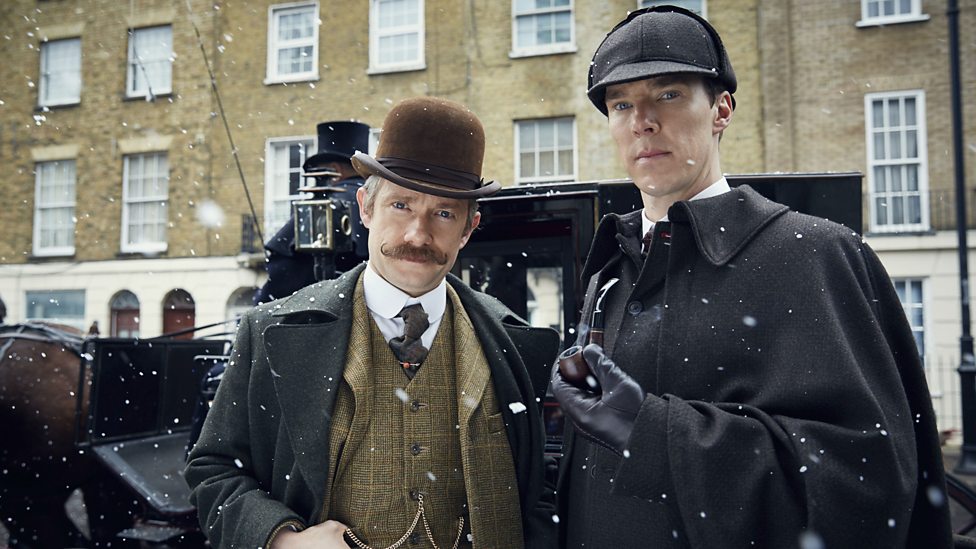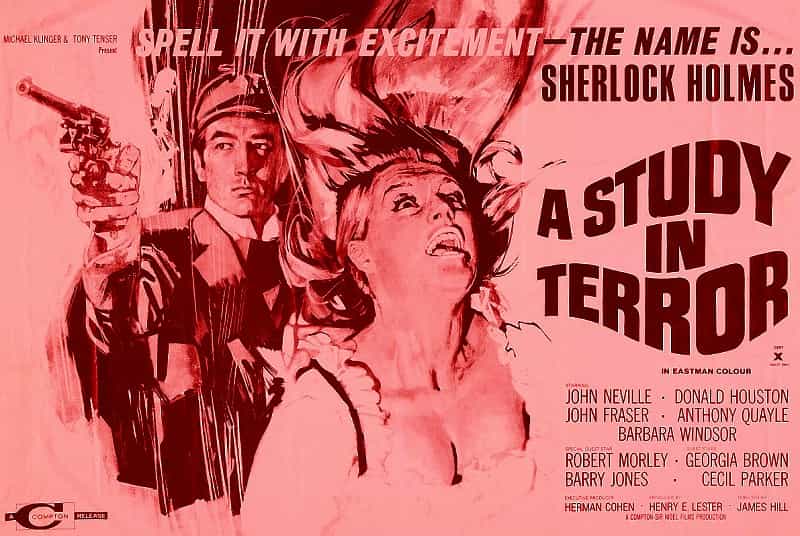Author MATT WINGETT describes TV’s Sherlock as ‘Moffat and Gatiss’s slow descent into nerddom’.

When Sherlock first hit the screen in 2010, there was something refreshingly new about the whole show. Suppose Sherlock Holmes, the uber-brilliant consulting detective had lived in the modern day? How would he cope? Who would he be? How would he use modern technology? Would the stories still hold the same fascination and pace in an age that had seen those stories remade – possibly hundreds of times?
The answer was a resounding yes. The first series, and the second, were masterpieces in extraordinarily inventive and tight screenwriting. They were also masterclasses in acting from Cumberbatch, Freeman, Stubbs and all. It was so real. So possible.
It had the double effect – it played to a general audience and simultaneously built up a passionate nerdy following who loved the whole mysterious vibe of the show, and sought to find clues and spot story elements others hadn’t – little “Easter Eggs” crafted into the scripts – pieces of self-knowingly ironic and clever-clever artifice that were clues and gifts for “real” fans. Those fans watched episodes obsessively, over and over again in order to divine the thoughts of the show’s writers and rushed to chatrooms, hoping to be the first to pant “Look what I’ve found!”
That side of the audience was always going to be the most vociferous. In a previous age they might well have been Puritans or Quakers discussing The Word in meeting houses – gleaning meaning from the holy script. Nowadays, they are fever-eyed fans to whom writers Gatiss and Moffat tip a wink, and in whose adulation the two hugely talented writers bask.
There is much that is good in Sherlock. Much that is brilliant. The dialogue is superb, funny, witty, ironic and crisp. The acting is nuanced and beautiful. Benedict Cumberbatch delivers his lines with such poise and incisiveness that one can’t help believing in him. Martin Freeman is believably down-to-Earth as he constantly goggles at the inscrutable genius of Cumberbatch’s Holmes. They are a brilliant pairing.
Whilst all of this is undoubtedly true, something in the tone of the show slipped as series three began. It was towards the far smaller and more specialist nerd audience that the writers began to give their attention in series three. The show was different, and not in a good way. Up to this point Gatiss and Moffat had been true to Sir Arthur Conan Doyle’s vision – penning neat, self-contained stories which demonstrated the ingenuity of Holmes’s labyrinthine mind and the limits of his personality at the same time. But always, most importantly, the satisfying, well-crafted, popular story.
Now, they began to do something else. What made the original Holmes interesting was that he stood out – a truly extraordinary man among ordinary people. By series three of Sherlock, that was no longer the case. Dr Watson was transformed fully into an adrenalin junkie seeking to replace the “thrills” of war in Afghanistan with civilian excitement.
His wife was no longer a doctor’s receptionist but an international assassin who scaled glass buildings with pulleys and suckers and could shoot with such surgical precision she could nearly kill Holmes in order to save his life, as if she had stepped straight out of a Bond/Marvel Universe franchise. Even the homely and cosy Mrs Hudson was the ex-wife of a drug-dealing gangster. It stopped feeling as if it could be real.
This played well to the nerdbase, but as their cries of adulation grew louder, I started to notice noises off, from those who were not so committed to the Gatiss-Moffat-verse. The trick in Doyle’s original writing was that in almost every story – not all, but nearly all – he included the voice of the common man, Dr Watson, as the trusted voice with which the reader could identify. It gave the stories the edge of just being real enough to fascinate without being tipped into the absurd. A fine balancing act. With the later episodes of Sherlock, that original vision was gone, I heard friends say.
And I agreed. A Dr Watson who is impressed, amazed and infuriated in equal measure by Holmes’s brilliance is the perfect interlocutor for the audience – the storyteller through whom we are also equally impressed – the man who embodies our own amazement. Turn him into an international man of mystery in his own right and possibly a reckless caper-addict, rather than the solid doctor reporting what he experiences in forensic detail, and there is no-one for the reader / viewer to identify with any longer. Just so with the transformations of the other characters. None of them were authentic – none of them had anything to do with ordinary people.
This ploy that should have added extra value to all of the characters in the end makes none of them seem real. Holmes’s absurdity as a character – a man who claims to have no understanding that the the earth revolves around the sun while having the most obscure knowledge of the types of splashmarks left by rain or thousands of brands of cigarettes – is only heightened by everyone around him being equally absurd.
Sherlock has lost my interest
That, I’m afraid, is when I began to lose interest. I hoped, with the “new” Sherlock set in the 1890s, that this would be a turning point in the show and they would recover it from its own self-consciousness. But no. What do we get? A sub-Scooby Doo plot. And an infantile plot driver.
Don’t get me wrong. There were many, many moments in this show I loved. The acting was brilliant, the sets sumptuous, the design and conception exquisite. Yet there was something ultimately unsatisfying about the show that came from the way its tone has changed.
One example – one of the biggest cop-outs in story writing is, “And he woke up and it was all a dream.” It’s almost unforgivable as a narrative device. Yet at its heart, that is essentially what we were served up in this excursion to Sherlockland.
I have a feeling that to the expense of a wider audience, Moffat and Gatiss are playing too much to the fan base. Let’s be clear – it’s their choice, and it’s their vision which they are following. And there is no doubt that they are both massively gifted writers whose output is so prolific that I can’t imagine how they do it. But focussing on the fans too much is bad politics.
It’s the general audience you should also wish to woo, rather than the card-carrying members. Many of the deep fans have openly stated they want the other show Moffat looks over, Dr Who, in some way to coincide with the Holmes universe. That has already happened with some of the phraseology used in both shows – notably the phrase “hidden in plain sight” has crossed over as the words to a central device in a number of episodes.
And now, here is Sherlock Holmes, time traveller, existing in two times simultaneously. What a surprise.
Dr Who and Sherlock Holmes, for the time being, have not yet collapsed into a tv singularity made of Victorian logic and Gallifreyan technology, but from the feel of this episode with all its timey wimey aspects, they are in danger of so doing. Moffat and Gatiss can and will carry on writing for the nerds.
There are a lot of them out there and I’m sure they’ll lap up everything the duo do. They will also continue to produce scintillating dialogue and clever-clever plots – but somewhere, the heart of the show has moved so far from the original conception that it leaves me cold.
I’ve had enough of this version of Holmes. It’s been a great ride. I’ve really loved it, but to be honest, I don’t like the direction this train is headed. I think it’s time to step off.
I’ll open the books again, and read the original stories, with all their pleasure and delight and none of the self-congratulation with which the tv series drips. Big respect to Cumberbatch and the team for the delights they’ve given me. Deerstalkers off, too, to Moffat and Gatiss. I think they’re brilliant writes. It’s just that this show isn’t right for me. Something is missing, and like Mycroft according to Sherlock, it might just be its heart
So, thanks, Sherlock – and goodbye . It was fun for a while.
What do you think of TV’s Sherlock? Tell us in the comments section below!








yes Moffat and Gatiss have strayed a bit too far from Conan Doyle for me and fallen into that Moriarty trap that bedevils so many Holmes pastiches. And as for virtually turning Mary Watson into Buffy, well I’m not sold. Don’t get me wrong I did enjoy the New Year’s special, but like you felt the waking from the dream device was a big cop out.